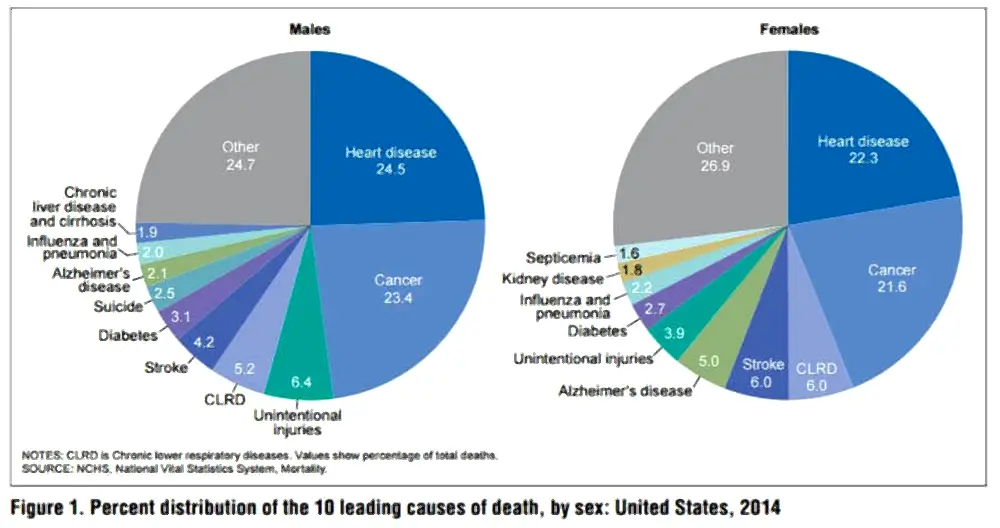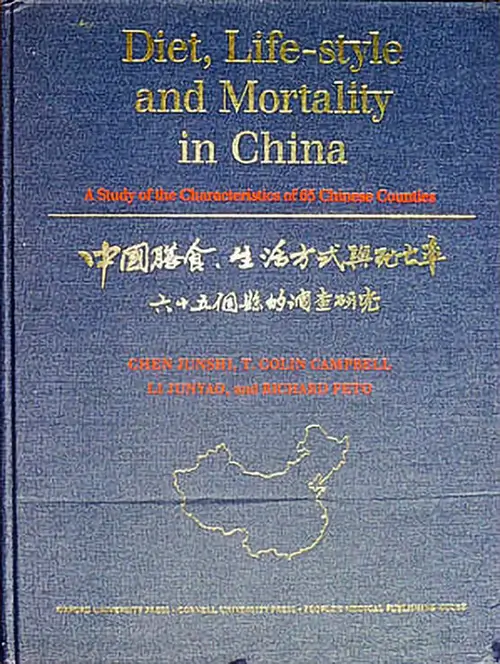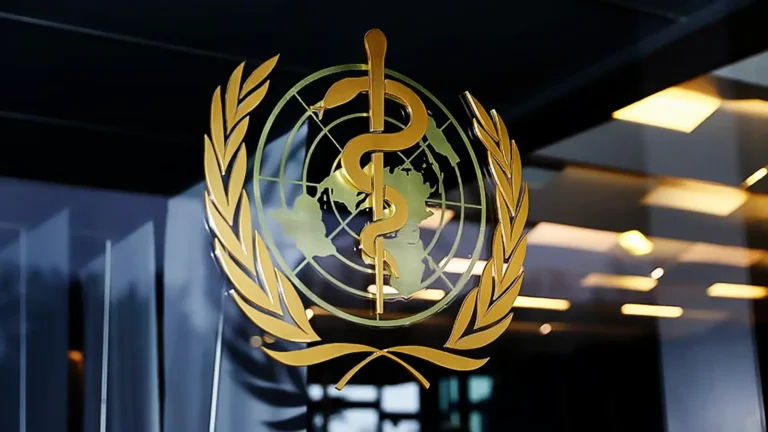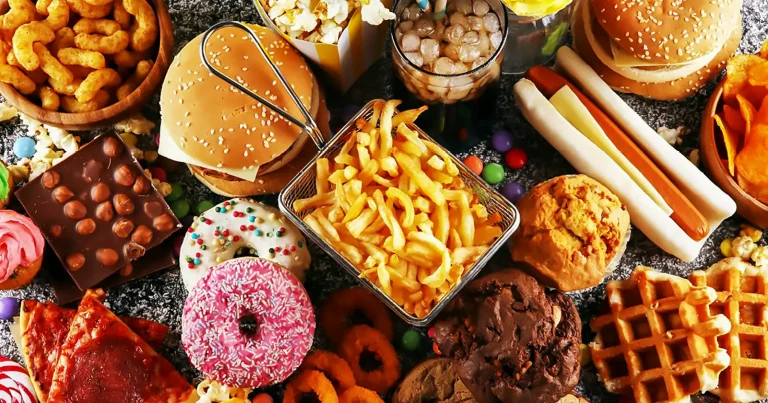China study- The vegan argument
China study showed that there is no heart disease or cancer or diabetes in undeveloped rural communities in the world with starch-based vegan diets.
Milos Pokimica
Written By: Milos Pokimica
Medically Reviewed by: Dr. Xiùying Wáng, M.D.
Updated June 9, 2023When we look at our mortality rates we will soon realize that something is not as it should be. One in four people will die from cancer one in four from heart disease or stroke. Even if we avoid death from some form of chronic disease we will have an increase in risk from many illnesses that will affect our quality of life even if we do not die from them. And this is not natural. For example, the situation in rural China is different as the China study showed.
There is no heart disease or cancer or diabetes at such a high rate in the animal kingdom also. What this means is that most of the so-called diseases of affluence are caused by diet. That is it. We all have health issues and diseases because of our evolutionary incongruent life. Genetic predisposition is not a root cause. It was a big debate about the root causes of modern health issues in the scientific community for a long time. Then a line of studies was conducted and the scientists found the answer. The scientist looked at people in different parts of the world that were stricken by poverty and as a consequence had plant-based diets that were based on some form of starch like rice for example with no marginal animal product consumption.
Maybe one of the most extensive studies in this field was The China–Cornell–Oxford Project (The China Study). A large observational study was conducted in rural China in the 1980s, co-financed by Oxford University, Cornell University, and the Government of China. The study was comprehensive and included 367 different variables.
A total of 65 counties in China with 6,500 adults were examined with a medical examination, blood tests, questionnaires, etc. In 1983 two random villages were chosen in each of the 65 rural counties of China and 50 families were randomly selected in each village. The eating habits of one adult member of each family, half men and half women were examined. The results were compared with mortality rates in those counties for 48 forms of cancers and other diseases during 1973-75.
It was one of the most significant studies ever done known as The China Study.
I will use some quotes from “The China Study”.
“In rural China, fat intake was less than half that in the United States, and fiber intake was 3 times higher. Animal protein intake was very low, only about 10% of the US intake. Mean serum total cholesterol was 127 mg/dL in rural China versus 203 mg/dL for adults aged 20-74 years in the United States. Coronary artery disease mortality was 16.7-fold greater for US men and 5.6-fold greater for US women than for their Chinese counterparts.”
(Campbell et al., 1998)
“When we were done, we had more than 8,000 statistically significant associations between lifestyle, diet, and disease variables.” “The results of these, and many other studies showed nutrition to be far more important in controlling cancer promotion than the dose of the initiating carcinogen.”
(Campbell et al., 1998)
And this correlation was for all types of cancers, not just breast cancer which was almost none existent but many other forms of cancers also. They even had a difficult time finding women who know other people who had breast cancer. People who were living in these rural areas of China knew about the disease but had never seen it. No acne for example either. Many diseases and cancers are associated with hormones like IGF-1.
No diabetes also. They were eating nothing but rice and still, diabetes was no concern. Paleo diet people have a hard time with that one. They believe white rice is correlated with diabetes like any other refined carbohydrate. Then no heart disease, and so on.
“People who ate the most animal-based foods got the most chronic disease. People who ate the most plant-based foods were the healthiest.”
(Campbell et al., 1998)
Whether you become vegan or not, they suggested you put as many plants as possible on your plate at every meal. The study concluded that the counties with high consumption of food of animal origin in 1983-84 were also expected to have higher mortality rates from western diseases, while the opposite was true for the counties that consumed more plant-based food.
Now we can say this is maybe not related to their diet because there are a lot of other factors like exercise. These people mostly do manual labor, and maybe that was what sustained them. There were other variables too. Also, again this is not the only study of this kind. The problem with this kind of data is that goes against the interests of the industry, and because it is a significant study, it can be hard time disproving it. What they do is usually make false logic knowing that most people do not care and need to hear something they like to justify their unhealthy behaviors.
There is a good quote from T. Colin Campbell in The China Study that said:
“Americans love to hear good things about their bad habits.”
(Campbell et al., 1998)
For example, after the book, The China Study was published and made an impact, the written debate came. In 2008, “nutritionist” Loren Cordain argued that:
“The fundamental logic underlying Campbell’s hypothesis (that low [animal] protein diets improve human health) is untenable and inconsistent with the evolution of our own species.”
Loren Cordain
She argued that there are cultures like the Maasai people and the Eskimos that do not suffer from health issues described by the authors. That is entirely false by the way. However, wait. How far does the evolution of our species go?
It is highly unlikely that educated people like her do not understand how evolution works. Maybe evolution goes as much as we need it to go so that we can justify our agenda. This is an inversion in the purest form. Nothing to do with science.
People like nutritionist Loren Cordain know very well what real evolution looks like, they are not idiots. For every single study, we will have doctors with Ph.D.s popping up like mushrooms trying to mud the water with different data just enough to make confusion knowing well enough that people do what feels good not what is right. There were charges against Campbell that he distorted and misrepresented the data from the study and that he had numerous flaws in his reasoning.
The problem was it was just statistical correlations. His work is actually not that of a big deal. There were other similar statistical studies and studies in biochemistry that later proved most of this statistical correlation observed in the ’80s in real in vivo and in vitro experiments. This study is old news just the book came out recently and made the system angry. Here is one example from sciencebasedmedicine.org.
“I did not look at the praise or criticism of others until after I read the book, and the following represents my independent impressions. I approached the book as I do any book with scientific references: I read until I come across a statement of fact that strikes me as questionable, and then I check the references given for the statement. This immediately got me off on the wrong foot with this book. In the first chapter, I found the statement: “Heart disease can be prevented and even reversed by a healthy diet.”
sciencebasedmedicine.org
The doctor concluded that: “Health is more than just diet.” You can trust The SkepDoc. Forget the study that took ten years and was compiled on 894 pages. She would tell you the real truth. She is a retired family physician who writes about pseudoscience and questionable medical practices and completed her internship in the Air Force (the second female ever to do so). How wrong of Dr. Campbell to say that. He did write in the book: “Eating foods that contain any cholesterol above 0 mg is unhealthy.”
This can be an emotional issue because most of us are addicted to our dietary habits. Just imagine that. Dr. Campbell observed a correlation between cholesterol and heart disease back in the ’80s. A very scientific and unbiased review of scienebasedmadice.org. This kind of conflicting data made my life hard. I had to spend years of my own research.
Are you confused? Here is one statistic from the study. In Guizhou County, there was no single recorded coronary artery disease death from 246,000 men over a period of 3 years. There is nothing natural about heart disease.
Number one terrorist killer in the West.
References:
T. Colin Campbell Center for Nutrition Studies NutritionStudies.org
- Chen, K., & Jin, M. (2007). Mortality, Biochemistry, Diet and Lifestyle in Rural China. Geographical Study of the characteristics of 69 Counties in mainland China and 16 Areas in Taiwan. Journal of Epidemiology and Community Health, 61(3), 271.[PubMed]
- Campbell, T. C., Parpia, B., & Chen, J. (1998). Diet, lifestyle, and the etiology of coronary artery disease: the Cornell China study. The American journal of cardiology, 82(10B), 18T–21T. https://doi.org/10.1016/s0002-9149(98)00718-8
Related Posts
Do you have any questions about nutrition and health?
I would love to hear from you and answer them in my next post. I appreciate your input and opinion and I look forward to hearing from you soon. I also invite you to follow us on Facebook, Instagram, and Pinterest for more diet, nutrition, and health content. You can leave a comment there and connect with other health enthusiasts, share your tips and experiences, and get support and encouragement from our team and community.
I hope that this post was informative and enjoyable for you and that you are prepared to apply the insights you learned. If you found this post helpful, please share it with your friends and family who might also benefit from it. You never know who might need some guidance and support on their health journey.
– You Might Also Like –

Learn About Nutrition
Milos Pokimica is a doctor of natural medicine, clinical nutritionist, medical health and nutrition writer, and nutritional science advisor. Author of the book series Go Vegan? Review of Science, he also operates the natural health website GoVeganWay.com
Medical Disclaimer
GoVeganWay.com brings you reviews of the latest nutrition and health-related research. The information provided represents the personal opinion of the author and is not intended nor implied to be a substitute for professional medical advice, diagnosis, or treatment. The information provided is for informational purposes only and is not intended to serve as a substitute for the consultation, diagnosis, and/or medical treatment of a qualified physician or healthcare provider.NEVER DISREGARD PROFESSIONAL MEDICAL ADVICE OR DELAY SEEKING MEDICAL TREATMENT BECAUSE OF SOMETHING YOU HAVE READ ON OR ACCESSED THROUGH GoVeganWay.com
NEVER APPLY ANY LIFESTYLE CHANGES OR ANY CHANGES AT ALL AS A CONSEQUENCE OF SOMETHING YOU HAVE READ IN GoVeganWay.com BEFORE CONSULTING LICENCED MEDICAL PRACTITIONER.
In the event of a medical emergency, call a doctor or 911 immediately. GoVeganWay.com does not recommend or endorse any specific groups, organizations, tests, physicians, products, procedures, opinions, or other information that may be mentioned inside.
Editor Picks –
Milos Pokimica is a health and nutrition writer and nutritional science advisor. Author of the book series Go Vegan? Review of Science, he also operates the natural health website GoVeganWay.com
Latest Articles –
Top Health News — ScienceDaily
- The overlooked nutrition risk of Ozempic and Wegovyon February 4, 2026
Popular weight-loss drugs like Ozempic and Wegovy can dramatically curb appetite, but experts warn many users are flying blind when it comes to nutrition. New research suggests people taking these medications may not be getting enough guidance on protein, vitamins, and overall diet quality, increasing the risk of muscle loss and nutrient deficiencies.
- A 25-year study found an unexpected link between cheese and dementiaon February 4, 2026
A massive Swedish study tracking nearly 28,000 people for 25 years found an unexpected link between full-fat dairy and brain health. Among adults without a genetic risk for Alzheimer’s, eating more full-fat cheese was associated with a noticeably lower risk of developing the disease, while higher cream intake was tied to reduced dementia risk overall. The findings challenge decades of low-fat dietary advice but come with important caveats.
- MIT’s new brain tool could finally explain consciousnesson February 4, 2026
Scientists still don’t know how the brain turns physical activity into thoughts, feelings, and awareness—but a powerful new tool may help crack the mystery. Researchers at MIT are exploring transcranial focused ultrasound, a noninvasive technology that can precisely stimulate deep regions of the brain that were previously off-limits. In a new “roadmap” paper, they explain how this method could finally let scientists test cause-and-effect in consciousness research, not just observe […]
- Why heart disease risk in type 2 diabetes looks different for men and womenon February 4, 2026
Scientists are digging into why heart disease risk in type 2 diabetes differs between men and women—and sex hormones may be part of the story. In a large Johns Hopkins study, men with higher testosterone had lower heart disease risk, while rising estradiol levels were linked to higher risk. These hormone effects were not seen in women. The results point toward more personalized approaches to heart disease prevention in diabetes.
- Sound machines might be making your sleep worseon February 4, 2026
Sound machines may not be the sleep saviors many believe. Researchers found that pink noise significantly reduced REM sleep, while simple earplugs did a better job protecting deep, restorative sleep from traffic noise. When pink noise was combined with outside noise, sleep quality dropped even further. The results suggest that popular “sleep sounds” could be doing more harm than good—particularly for kids.
- This unexpected plant discovery could change how drugs are madeon February 3, 2026
Plants make chemical weapons to protect themselves, and many of these compounds have become vital to human medicine. Researchers found that one powerful plant chemical is produced using a gene that looks surprisingly bacterial. This suggests plants reuse microbial tools to invent new chemistry. The insight could help scientists discover new drugs and produce them more sustainably.
- A hidden cellular process may drive aging and diseaseon February 3, 2026
As we age, our cells don’t just wear down—they reorganize. Researchers found that cells actively remodel a key structure called the endoplasmic reticulum, reducing protein-producing regions while preserving fat-related ones. This process, driven by ER-phagy, is tied to lifespan and healthy aging. Because these changes happen early, they could help trigger later disease—or offer a chance to stop it.
PubMed, #vegan-diet –
- Diet type and the oral microbiomeon February 2, 2026
CONCLUSION: The diet-oral microbiome-systemic inflammation axis is bidirectional and clinically relevant. Understanding both direct ecological regulation and indirect metabolic effects is essential to support precision nutrition strategies aimed at maintaining oral microbial balance and systemic inflammatory risk mitigation.
- Consensus document on healthy lifestyleson January 22, 2026
Proteins are a group of macronutrients that are vital to our lives, as they perform various functions, including structural, defensive and catalytic. An intake of 1.0-1.2 g/kg/body weight per day would be sufficient to meet our needs. Carbohydrate requirements constitute 50 % of the total caloric value and should be obtained mainly in the form of complex carbohydrates. In addition, a daily intake of both soluble and insoluble fiber is necessary. Regular consumption of extra virgin olive oil […]
- Vitamin B12 and D status in long-term vegetarians: Impact of diet duration and subtypes in Beijing, Chinaon January 21, 2026
CONCLUSIONS: This study reveals a dual challenge among Beijing long-term vegetarians: vitamin B12 deficiency was strongly associated with the degree of exclusion of animal products from the diet (veganism), while vitamin D deficiency was highly prevalent and worsened with longer diet duration. The near-universal vitamin D deficiency observed in this study suggests that, in the Beijing context, the risk may extend beyond dietary choice, potentially reflecting regional environmental factors;…
- Nutritional evaluation of duty meals provided to riot police forces in Germanyon January 13, 2026
Background: The primary role of the German riot police is maintaining internal security. Due to challenging working conditions, riot police forces face an elevated risk of various diseases. During duty, forces are provided with meals. A balanced diet can reduce the risk of some of these diseases and contribute to health-promoting working conditions. Aim: First evaluation of the nutritional quality of duty meals in Germany based on German Nutrition Society recommendations (DGE). Methods: In…
- Iodineon January 1, 2006
Iodine is an essential trace nutrient for all infants that is a normal component of breastmilk. Infant requirements are estimated to be 15 mcg/kg daily in full-term infants and 30 mcg/kg daily in preterm infants.[1] Breastmilk iodine concentration correlates well with maternal urinary iodine concentration and may be a useful index of iodine sufficiency in infants under 2 years of age, but there is no clear agreement on a value that indicates iodine sufficiency, and may not correlate with […]
Random Posts –
Featured Posts –
Latest from PubMed, #plant-based diet –
- From paddy soil to dining table: biological biofortification of rice with zincby Lei Huang on February 4, 2026
One-third of paddy soils are globally deficient in zinc (Zn) and 40% of Zn loss in the procession from brown rice to polished rice, which results in the global issue of hidden hunger, e.g., the micronutrient deficiencies in the rice-based population of developing countries. In the recent decades, biofortification of cereal food crops with Zn has emerged as a promising solution. Herein, we comprehensively reviewed the entire process of Zn in paddy soil to human diet, including the regulatory…
- Molecular Characterization of Tobacco Necrosis Virus A Variants Identified in Sugarbeet Rootsby Alyssa Flobinus on February 3, 2026
Sugarbeet provides an important source of sucrose; a stable, environmentally safe, and low-cost staple in the human diet. Viral diseases arising in sugarbeet ultimately impact sugar content, which translates to financial losses for growers. To manage diseases and prevent such losses from occurring, it is essential to characterize viruses responsible for disease. Recently, our laboratory identified a tobacco necrosis virus A variant named Beta vulgaris alphanecrovirus 1 (BvANV-1) in sugarbeet…
- Nutrition in early life interacts with genetic risk to influence preadult behaviour in the Raine Studyby Lars Meinertz Byg on February 3, 2026
CONCLUSIONS: Nutrition in early life and psychiatric genetic risk may interact to determine lasting child behaviour. Contrary to our hypothesis, we find dietary benefits in individuals with lower ADHD PGS, necessitating replication. We also highlight the possibility of including genetics in early nutrition intervention trials for causal inference.
- Effect of the gut microbiota on insect reproduction: mechanisms and biotechnological prospectsby Dilawar Abbas on February 2, 2026
The insect gut microbiota functions as a multifunctional symbiotic system that plays a central role in host reproduction. Through the production of bioactive metabolites, gut microbes interact with host hormonal pathways, immune signaling, and molecular regulatory networks, thereby shaping reproductive physiology and fitness. This review summarizes recent advances in understanding how gut microbiota regulate insect reproduction. Accumulating evidence demonstrates that microbial metabolites…
- Rationale and design of a parallel randomised trial of a plant-based intensive lifestyle intervention for diabetes remission: The REmission of diabetes using a PlAnt-based weight loss InteRvention…by Brighid McKay on February 2, 2026
CONCLUSIONS: This trial will provide high-quality clinical evidence on the use of plant-based ILIs to address the epidemics of obesity and diabetes to inform public health policies and programs in Canada and beyond.
- Diet type and the oral microbiomeby Daniel Betancur on February 2, 2026
CONCLUSION: The diet-oral microbiome-systemic inflammation axis is bidirectional and clinically relevant. Understanding both direct ecological regulation and indirect metabolic effects is essential to support precision nutrition strategies aimed at maintaining oral microbial balance and systemic inflammatory risk mitigation.






















